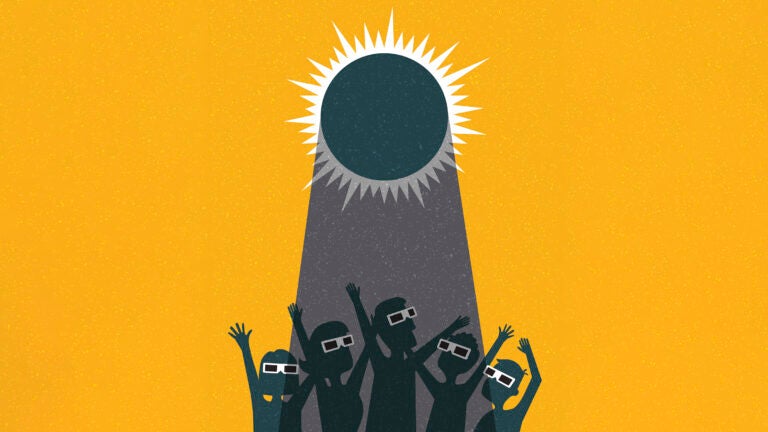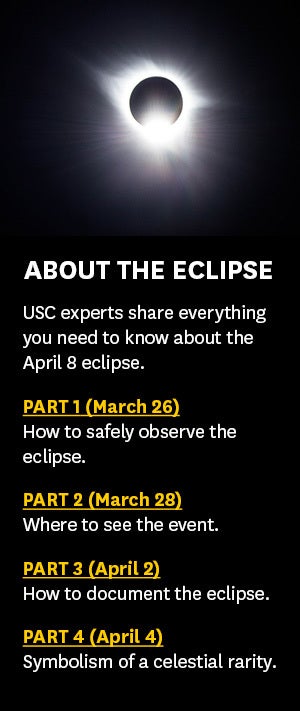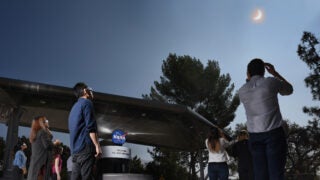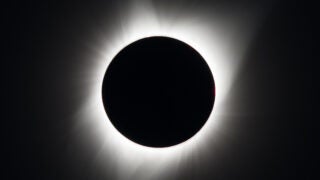
“In a lot of mythic traditions around the world, the sun and the moon are characters associated with particular deities,” said Tok Thompson, professor (teaching) of anthropology at the USC Dornsife College of Letters, Arts and Sciences. (Illustration/iStock)
What does a solar eclipse symbolize?
From ancient Navajo traditions to modern American political myths, eclipse symbolism varies across cultures.
 They’re doorways to scientific discoveries. They’ve inspired myths both modern and ancient. And, if not viewed properly, they can cause blindness.
They’re doorways to scientific discoveries. They’ve inspired myths both modern and ancient. And, if not viewed properly, they can cause blindness.
Total solar eclipses — which occur when the moon passes between the Earth and the sun, temporarily blocking the sun’s brilliance — are rare phenomena. On April 8, 2024, a total solar eclipse will be visible from the contiguous United States for the first time since 2017, and the next one won’t be visible from U.S. soil until 2044.
In USC News’ four-part series on the eclipse, USC experts weigh in on multiple aspects of this extraordinary celestial event: how to safely view the eclipse, the best place to see it, how to photograph it and its symbolism.
Part 4: What does a solar eclipse symbolize?
For many Americans, the total solar eclipse on April 8 will be an occasion for gathering and revelry. Cities, towns, parks, universities and organizations across the United States are hosting various celebratory events and festivals, some of which will span the weekend preceding the eclipse and the big day.
According to Tok Thompson, professor (teaching) of anthropology at the USC Dornsife College of Letters, Arts and Sciences, the impulse to treat the eclipse as a special occasion goes beyond its mere rarity. It’s grounded in the profound meaning that humans the world over ascribe to the sun and the moon.
“A lot of cultures around the world pay very, very close attention to lunar cycles as well as solar cycles,” Thompson said.
Symbolism in the sky
Since time immemorial, gazing up at these two celestial bodies has been a shared human experience. Ancient civilizations began measuring months and years by tracking the moon and sun, a practice that influences the calendars in use today. These bright beacons overhead were also woven into powerful mythologies.
“In a lot of mythic traditions around the world, the sun and the moon are characters associated with particular deities,” said Thompson, an expert in the folklore of indigenous and minority societies. “They may be complementary deities or opposite deities. A lot of times, you find gender being projected onto the sun and the moon. One is masculine, and the other is feminine.”
The solar eclipse marks a time when these deities or energies fuse. “When the sun and the moon cycles come together, that’s been a really important moment for many civilizations,” Thompson said.
Different cultures ritualize the eclipse based on their belief systems. In Navajo (Dine’) tradition, the sun is considered a father figure, and its disappearance during the eclipse is regarded as a sacred period that calls for rest, reflection and prayer.
“This is a very serious time, an ominous time, a dangerous time, perhaps — but also a time of renewal,” said Thompson. “You’re not supposed to do anything, sort of like a Sabbath idea. Everything just stops out of respect for what’s going on at the cosmic level.”
Our search for meaning
Eclipses not only tap into ancient folklore but also inspire modern mythmaking.
The August 2017 total solar eclipse was the first coast-to-coast total eclipse in the United States in 99 years and the first total eclipse that could be seen only from U.S. soil. Dubbed “The Great American Eclipse,” it was seen by some as a herald of declining American power after 99 years of global ascendancy. Others suggested it was a sign of the downfall of then-President Donald Trump, who was born during a lunar eclipse.
“Eclipses come in cycles,” Thompson said. “These become eras. People tend to read into these cycles. This is how we measure the narratives of our lives.”
The upcoming April 8 eclipse has inspired everything from civic predictions to conspiracy theories to astrological forecasts.
Thompson believes that the inclination to make meaning from eclipses stems from our universal desire to understand our place in the cosmos.
“‘How do we fit into all this?’ is one of the eternal human questions,” he said.



